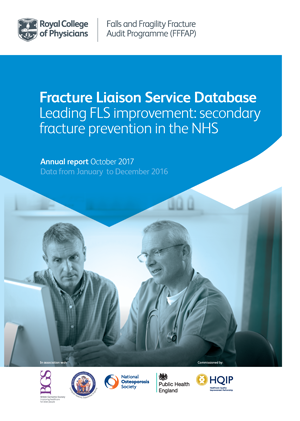Fracture Liaison Service Database (FLS-DB) clinical audit report October 2017
The Fracture Liaison Service Database (FLS-DB) clinical audit report 2017 considers the quality of service provision for secondary fracture prevention. As a result of the ageing demographic, secondary fracture prevention is a priority for health services at both the local and national levels. Providing effective secondary fracture prevention to all eligible patients would prevent almost 54,000 fractures within the first 5 years.
This report contains data on the first 12 months of the FLS-DB (patients diagnosed with a fragility fracture between January and December 2016). It examines how, in a short time frame, the FLSs in the NHS have engaged with the audit and improved the quality of data collection and case finding.
Key findings include:
- Although participation in the FLS-DB has improved, national coverage of secondary fracture prevention by FLSs remains inadequate.
- There have been substantial improvements in data quality. No audit question has more than 50% of data missing.
- There has been an improvement in the number of patients who receive a falls assessment (40% compared with 32% in the first report).
- Of the estimated number of fragility fracture patients, 40% were submitted to the FLS-DB with six FLSs now submitting at least 80% of their expected caseload.
- Overall, 67% of patients were assessed by an FLS within 90 days of their fracture.
- In total, 43% of patients were assessed with a DXA scan within 90 days of their fracture.
- Monitoring remains a concern. Although there has been an improvement, only 41% of patients who were prescribed anti-osteoporosis medication had monitoring contact documented within the audit.
Key recommendations include:
All FLSs should submit data to the FLS-DB. NHS foundation trusts are required to participate in National Clinical Audit and Patient Outcomes Programme (NCAPOP) audits that are relevant to the services that they provide as part of their NHS contract. Those services that are not currently participating should implement an urgent action plan to address this.
Click on the link below to download the report and read the findings in full.
Click on the link below to download the patient information leaflet published on 4 June 2018 below.


